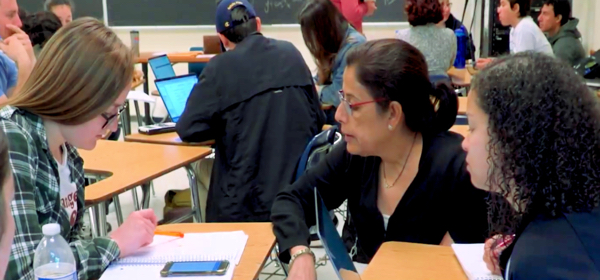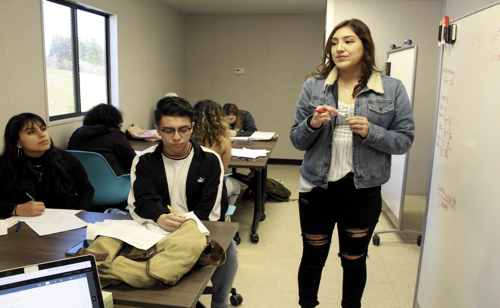Campus News
Pairing research excellence and status as a Hispanic-Serving Institution, UC Santa Cruz launching new programs to advance educational equity
Committed to creating educational equity that will help lead to real, transformative change, UC Santa Cruz will launch an array of new programs to support the success of Latinx, low-income, first-generation, and underrepresented students and prepare them for rewarding careers once they graduate.

Committed to creating educational equity that will help lead to real, transformative change, UC Santa Cruz will launch an array of new programs to support the success of Latinx, low-income, first-generation, and underrepresented students and prepare them for rewarding careers once they graduate.
“The HSI Initiatives focus on goals for strengthening the student experience and transforming our policies and practices to include and center students who have been and are minoritized in higher education,” said Charis Herzon, director of HSI Initiatives. “We seek to achieve holistic student success, provide equitable educational interventions and student-centered practices, and create structures, changes, and institutional investments as a public research university to serve as a leader for the University of California and the nation.”
National Hispanic-Serving Institution Awareness Week
National HSI Week is dedicated to celebrating and building awareness of the work and important role HSIs play in improving access to education, advancing equity practices, and the contributions in their communities. Visit the HSI Initiatives website or follow the team on Instagram @ucsc.hsi to find out about programing this week, including webinars with grant updates for GANAS Career and GANAS Graduate, and a webinar specifically for graduate students to with our new Graduate Services Counselor Angel Domiguez.
UC Santa Cruz leaders are focused on creating lasting change across campus that will serve current and future students. Top campus leaders have continued to work closely with the Division of Student Affairs and Success and its Hispanic-Serving Institution Initiatives team.
In collaboration with scores of faculty and staff across campus, the Hispanic Serving Institution Initiatives team will be launching—and continuing—a range of programs and services to support undergraduate and graduate students in their academic success.
The UC Santa Cruz HSI team is focused on creating educational equity for undergraduate and graduate students and addressing disparities that have been created by differing families, economic backgrounds, and educational experiences. The campus faculty and staff strive to understand and design programs that account for and correct these disparities.
Herzon said much of the past year was spent planning the new programs so they would be ready for this academic year.
“Our far-reaching collaborations and partnerships, both on campus and beyond, have been critical in the creativity involved in creating our grant activities and their successful implementation,” said Sara Sanchez, GANAS Graduate Program Director. “We create, plan, and execute in partnership and support of one another, enhancing the quality and reach of our initiatives—ultimately at the benefit of student success, including graduate student success with GANAS Graduate.”
Advancing undergraduate educational equity
Four new programs are supported by the campus’s five-year $3 million Graduating New American Scholars (GANAS) Career Pathways grant, awarded by the U.S. Department of Education last year.
The campus will offer a redesigned calculus course, provide supplemental instruction to support student learning, establish a new career internship program, and work with two departments to identify and address racial disparities.
UC Santa Cruz has been focused on redesigning foundational math courses that have been barriers to student success, particularly in connection with the biology major. The campus is shifting courses away from large lectures to instead focus on active-learning and problem-solving sessions to support inclusiveness and equity. The HSI team has already redesigned Math 2, Math 3, and Math 11 A, and will turn its attention to Math 11B in summer 2022.
The comprehensive overhauls are meant to increase course grades and passing rates and reduce achievement gaps. In Math 2, previous to the redesign, pass rates hoverd between 70-75% with gaps between latinx (60% pass rate) and white students (90% pass rate) at over 30%. In Math 2, the pass rate is up to 85-90% and the gaps have been cut in half. In Math 3 we found that students from the redesigned math course who received the same grade as matched peers in the non-redesigned math course received higher grades in downstream STEM courses.
Learning Support Services will be delivering supplemental instruction in courses where there are high rates of students who have Ds, Fs, or are at risk of failing or withdrawing. Highly-trained student leaders will offer small-group sessions to help their peers with learning critical course material. 
A new career internship program focused on science, technology, engineering and math (STEM) will invite students to apply later this fall. The students will be enrolled in a career course while also interning with nonprofits and businesses with the goal of helping to prepare the cohort to begin rewarding careers once they graduate.
Additionally, a team of faculty and staff experts will partner with the Linguistics Department and Molecular, Cell, and Developmental Biology Department to undertake a self-study meant to uncover and address equity gaps.
Programs to support students to and through graduate school
UC Santa Cruz was also awarded a $3 million grant from the US Department of Education last fall to support graduate students.
The GANAS Graduate Pathways grant is helping to unleash the potential of UC Santa Cruz to be a leading Hispanic-serving research institution by advancing educational equity among graduate students. UCSC is one of only a couple dozen HSIs that also has “very high levels of research,” as measured by the Carnegie Classification of Institutions of Higher Learning.
A new course, supported by the grant, will help undergraduates in applying and preparing for graduate school. The project is meant to help expand the pipeline of undergraduate students who decide to pursue an advanced degree and ensure they have the tools to succeed.
The campus will also be offering a training course in the arts for undergraduate and graduate students that is focused on having successful careers in the creative economy.
A new graduate service counselor, Angel Dominguez, will provide holistic advising with expertise in supporting first generation, historically low-income and BIPOC students.
The campus’s Latinx Initiative for Future Teachers (LIFT) will provide Latinx scholars interested in teaching with a streamlined pathway to the Master’s in Education and Teaching Credential (MA/C) Program, as well as mentorship and financial support while they are in the program.
UC Santa Cruz has also established the VOCES Graduate Student Writing Center, which provides Latinx, low-income, first-generation, and graduate students of color an array of writing strategies designed to address conceptual thinking, reading/literacy, and multiple forms of writing throughout graduate school.
The HSI team is planning to launch several more efforts in summer 2022, including a research opportunity program for students from UCSC and CSU Monterey Bay; a first-year experience course for incoming graduate students studying literature to expose them to different kinds of research; and a summer bridge program to support incoming graduate students.
Creating lasting change
Herzon said HSI grants help to create transformational change at UC Santa Cruz both by creating positive changes in the academic landscape and by establishing new programs that can continue beyond the term of a grant.
This includes sustaining positions such as the Chicanx/Latinx Resources Center Program Coordinator that was initially funded by the MAPA grant. That grant ended in September 2020 with the campus now funding that position. Building transfer pathways with programs such as cross-enrollment are also set to continue this year under a soon-to-be-hired Cultivamos Excelencia Director.
With students returning to in-person instruction the STEM Hub in the Science Library will be where students can find EOP Advising and Learning Support Services learning sessions.
The campus’s SEMILLA grant, a $5.7 million grant awarded in fall 2016, is ending this year. That grant helped Latinx students pursue STEM degrees and instructors clear barriers to success inside and outside the classroom. The grant funded programs in math, writing, career development, and more.
The campus will continue to run its SEMILLA scholars program–supporting first-year students who are planning to major in a STEM field by providing additional counseling, helping them get familiar with their major and fostering a sense of belonging.
“Overall we have had successes and we still have a lot of work to do,” Herzon said. “We have been successful in developing race-conscious, equity-minded, faculty and staff practitioners. These practitioners regularly review disaggregated data and seek to understand our students’ experience at UCSC with curiosity, vulnerability, with the intent and ability to take action.
“We are happy to report that our change in practices and policies benefit Latinx students and in our analysis, we have found that they benefit all students. We look forward to implementing the new programs and partnering with our students and their journey as we start this new academic year.”